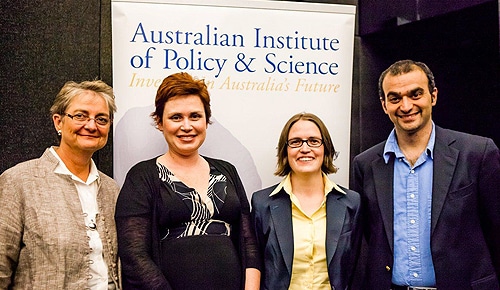5 November 2012
 |
NSW Young Tall Poppy Science Award winners Associate Professor Renae Ryan (second left) and Dr Tara Murphy (second right) with their award nominators Professor Carol Armour (far left), Associate Dean for Career Development in the Sydney Medical School, and Professor Bryan Gaensler (far right), Director of CAASTRO. |
Searching for the afterglows of gamma-ray bursts and understanding how the 'vacuum cleaners' of our brains work are the research goals that have seen two University of Sydney scientists honoured for their work.
Last week Dr Tara Murphy, from the School of Physics and School of Information Technologies, won the NSW Young Tall Poppy of the Year Award and Associate Professor Renae Ryan, from the Bosch Institute and Sydney Medical School won a NSW Young Tall Poppy Science Award.
Run by the Australian Institute of Policy and Science, the Young Tall Poppy Science Awards recognise young scientists who are doing outstanding work in their field and actively engaging and educating the community. This year nine scientists from NSW were acknowledged.
Working in astroinformatics, Dr Murphy is leading a major international project that will run on the Australian Square Kilometre Array Pathfinder, an Australian next generation radio telescope. Dr Murphy's project aims to search for the 'orphan afterglows' of gamma-ray bursts.
"The challenge is finding these rare objects among the hundreds of thousands of other 'normal' objects that the telescope will find each night," said Dr Murphy.
Among the aims of the Tall Poppy awards are fostering an Australian culture which celebrates high achievers rather than 'cutting them down' and inspiring younger Australians about the possibilities of science.
"During my year of Tall Poppy activities I will be part of the Science Challenge, an online competition for high school students and the general public, covering a range of science areas. It is based on the success of the National Computer Science School Challenge - a programming competition that I have been running with my colleague, James Curran, for the last eight years," said Dr Murphy.
Associate Professor Renae Ryan was recognised for the work she does on proteins in the brain called neurotransmitter transporters.
"Neurotransmitters are the chemical messengers that allow the cells in our brain to communicate with each other. Neurotransmitter transporters are the 'vacuum cleaners of the brain' because they suck neurotransmitters back into cells after they have sent their message," said Associate Professor Ryan.
When these vacuum cleaners break down or become blocked, they stop clearing these messengers which leads to confusion and ultimately cell death in the brain. These processes underlie the damage in many brain diseases including Alzheimer's disease, epilepsy, stroke and schizophrenia.
"I am trying to understand exactly how these vacuum cleaners work and what goes wrong when they stop working. The outcomes of my research will provide the basic information for the development of new medications to treat debilitating brain diseases," said Associate Professor Ryan.
"Winning a Tall Poppy award is a real honour as they not only recognise scientific achievement, but also community engagement. I am looking forward to working with high school students over the coming year and hope to inspire some to consider a career in science. I am especially interested in attracting more girls into studying science and am passionate about trying to support women to continue in their scientific careers."
Media enquiries: Verity Leatherdale, 02 9351 4312, 0403 067 342, verity.leatherdale@sydney.edu.au
Source: http://sydney.edu.au/news/84.html?newsstoryid=10442
bagpipes aspirin aspirin 21 jump street illinois primary results acapulco mexico hines ward
No comments:
Post a Comment
Note: Only a member of this blog may post a comment.